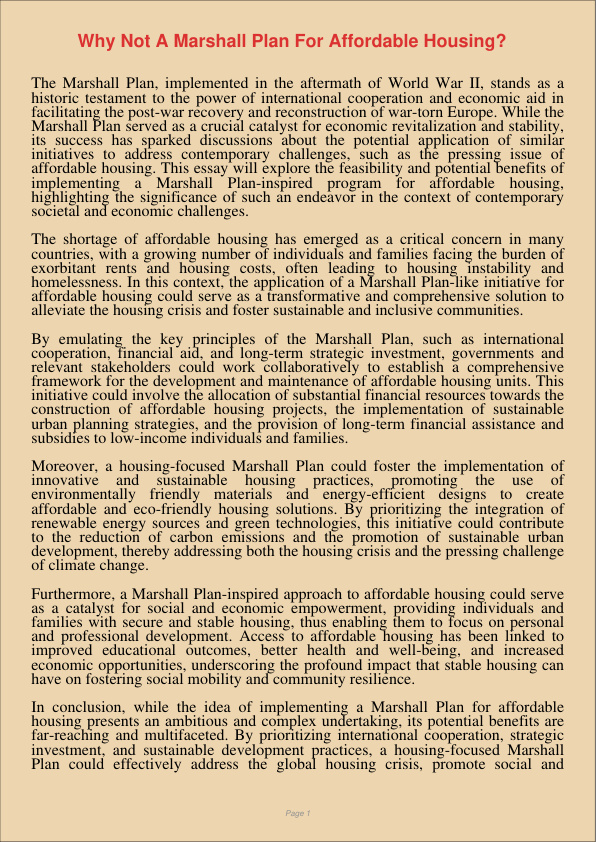Why Not A Marshall Plan For Affordable Housing
Dec 31, 2023
marshall plan
affordable housing
Business
Psychology

The Marshall Plan, implemented in the aftermath of World War II, stands as a historic testament to the power of international cooperation and economic aid in facilitating the post-war recovery and reconstruction of war-torn Europe. While the Marshall Plan served as a crucial catalyst for economic revitalization and stability, its success has sparked discussions about the potential application of similar initiatives to address contemporary challenges, such as the pressing issue of affordable housing. This essay will explore the feasibility and potential benefits of implementing a Marshall Plan-inspired program for affordable housing, highlighting the significance of such an endeavor in the context of contemporary societal and economic challenges.
The shortage of affordable housing has emerged as a critical concern in many countries, with a growing number of individuals and families facing the burden of exorbitant rents and housing costs, often leading to housing instability and homelessness. In this context, the application of a Marshall Plan-like initiative for affordable housing could serve as a transformative and comprehensive solution to alleviate the housing crisis and foster sustainable and inclusive communities.
By emulating the key principles of the Marshall Plan, such as international cooperation, financial aid, and long-term strategic investment, governments and relevant stakeholders could work collaboratively to establish a comprehensive framework for the development and maintenance of affordable housing units. This initiative could involve the allocation of substantial financial resources towards the construction of affordable housing projects, the implementation of sustainable urban planning strategies, and the provision of long-term financial assistance and subsidies to low-income individuals and families.
Moreover, a housing-focused Marshall Plan could foster the implementation of innovative and sustainable housing practices, promoting the use of environmentally friendly materials and energy-efficient designs to create affordable and eco-friendly housing solutions. By prioritizing the integration of renewable energy sources and green technologies, this initiative could contribute to the reduction of carbon emissions and the promotion of sustainable urban development, thereby addressing both the housing crisis and the pressing challenge of climate change.
Furthermore, a Marshall Plan-inspired approach to affordable housing could serve as a catalyst for social and economic empowerment, providing individuals and families with secure and stable housing, thus enabling them to focus on personal and professional development. Access to affordable housing has been linked to improved educational outcomes, better health and well-being, and increased economic opportunities, underscoring the profound impact that stable housing can have on fostering social mobility and community resilience.
In conclusion, while the idea of implementing a Marshall Plan for affordable housing presents an ambitious and complex undertaking, its potential benefits are far-reaching and multifaceted. By prioritizing international cooperation, strategic investment, and sustainable development practices, a housing-focused Marshall Plan could effectively address the global housing crisis, promote social and economic empowerment, and contribute to the creation of inclusive and sustainable communities. As the world grapples with the challenges of housing affordability and sustainability, the consideration of innovative and collaborative initiatives inspired by the principles of the Marshall Plan holds the potential to transform the way we approach housing and urban development in the 21st century.